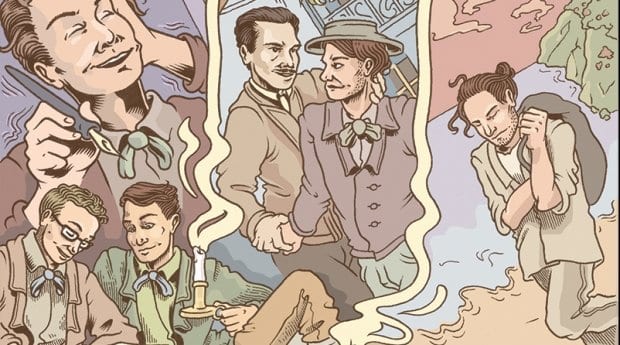Poets Arthur Rimbaud and his lover Paul Verlaine have been analyzed and celebrated myriad times. In “You’re Gonna Make Me Lonesome When You Go,” Bob Dylan includes the line “Relationships have all been bad/Mine’ve been like Verlaine’s and Rimbaud.” Patti Smith’s song “Easter” is about Rimbaud’s first communion. Jim Morrison, of The Doors, wrote to Wallace Fowlie in 1968 to thank him for his English translation of Rimbaud’s poems; Fowlie subsequently wrote the book Rimbaud and Jim Morrison: The Rebel as Poet. Jack Kerouac and the Beat poets honoured Rimbaud for his systematic disordering of the senses. Proust said that Rimbaud was “almost superhuman.” Edmund White ends his biography, Rimbaud: The Double Life of a Rebel, with the line “Every important thinker and artist of the last hundred years has had an opinion about Rimbaud, who continues to elude us as he streaks just ahead of our grasp on his ‘soles of wind.’”
In July 1870, France was in turmoil under the Prussian occupation, as was a 16-year-old Rimbaud, who chafed against the confines of his strict Catholic home and dull rural hometown. Rimbaud was massively precocious and enamoured with an anthology published in Paris called The Contemporary Parnassus. It exposed him to the avant-garde and to the work of one of the few poets he respected, Paul Verlaine. When Paris rebelled in spring of 1871 and elected a communist government, Rimbaud must have slavered over the excitement of it.
“Come, dear great soul, we call you, we await you,” is the invitation Verlaine issued in response to a flirtatious request from the young and attractive Rimbaud. Rimbaud arrived in Paris with little apart from his masterpiece, the 200-line poem “The Drunken Boat.” He descended on Verlaine’s shaky domestic situation with dirty fingernails, provincial habits and a quest to disorder his senses via alcohol and drugs for artistic purpose. Verlaine’s tenuous hold on sobriety was no match for the influence of the dominant and erotically available Rimbaud. The two flaunted their homosexuality, and their wild habits gradually made them unwelcome in Parisian literary circles. They wrote scandalous poems to one another, including “Sonnet of the Asshole,” which includes the lines “Dark and puckered like a violet carnation/It breathes, humbly lurking amidst the moss,” and “It’s the shrivelled olive and the flute-hugger.”
In 1873, when Rimbaud was only 19 and in the midst of writing his best-known work, A Season in Hell, Verlaine drunkenly shot him in the wrist (it’s hard to say what part of Rimbaud he meant to hit). In a time before antibiotics, this was a very dangerous injury. Biographer Graham Robb suggests that Verlaine feared Rimbaud would denounce him as a homosexual in order to blackmail Verlaine out of reconciling with his wife, Mathilde. If Robb is correct, then Verlaine must have been very intoxicated, indeed, not to realize that his marriage was already effectively over. Further, shooting Rimbaud led to police attention, and when the courts became interested in the nature of his sexual relationship with Rimbaud, Verlaine went to prison for two years.
Shortly after he was released, he and Rimbaud split for good. Rimbaud travelled extensively and tried a variety of occupations, from the Dutch navy to running guns in Ethiopia. His violent yearning for release and to make an artistic mark has had lasting impact, perhaps because it mirrors a common youthful struggle, especially among young gays. White reminisces about discovering Rimbaud’s poetry when he was 16 at a boarding school outside Detroit: “I, too, wanted to escape the ennui of my petit-bourgeois world and embrace bohemia. I, too, wanted to forgo years of apprenticeship and shoot to the artistic top as a prodigy, not a drudge. I, too, wanted to make men leave their wives and run off with me.” Similarly, I grew up in various rural towns in Northern Ontario, was precocious — though, perhaps not quite a genius —and left home at 16 to live with an older man in Toronto. Though he was probably capable of it, he never shot me, but leaving home did launch me into an inspirational Rimbaudian world of passion, violence and mad gay poets.
(History Boys appears on Daily Xtra on the first and third Tuesday of every month. You can
also follow them on Facebook.)


 Why you can trust Xtra
Why you can trust Xtra


